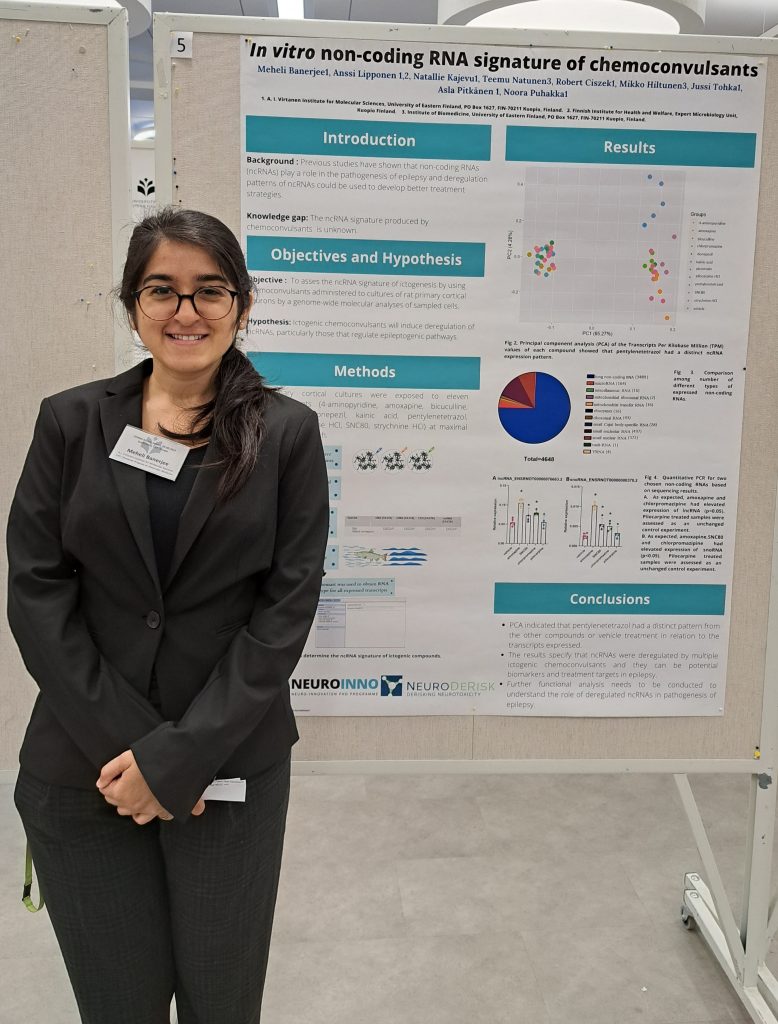14.11.2022 Meheli Banerjee: My journey to the brain
Meheli Banerjee: My journey to the brain
In this world of relentless social media scavenging, I found my inspiration to pursue the field of biology from my dad, a full-time doctor by profession. The stories about patients, which seemed horrifying to everyone else at the dinner table, intrigued me. The intricate design of the human body was something that I knew I had to delve deeper into. It was then that I grew an interest in the three-coded language of the body, genetics.
I pursued my integrated masters in the field of Biotechnology from St. Xavier’s college, Kolkata (India) with the intention to have theoretical and practical knowledge about manipulating genes. As I treaded along this path, I encountered epigenetics. The science behind controlling a gene with external factors such as environment, non-coding RNAs etc. presented itself as a mode to achieve my initial goal of manipulating genes. I spent my master’s thesis working on epigenetics in psoriasis in Indian Statistical Institute, Kolkata (India). When I started writing my thesis there would be times that articles relating to epigenetics and neurological diseases would pop up and I would find myself wandering off and reading those. The interest of manipulating brain disease genes started developing in me. This led me to pursue my internship on Alzheimer’s disease models in rats and zebrafish at Narsee Monjee Institute of Management Studies in the department of Pharmacy, Mumbai (India). These experiences molded my specific interest in studying the role of epigenetics in brain disease which led me to the Neuro-innovation project. I believe that the key to research is in small steps towards the right direction. An African proverb, “If you think you are too small to make a difference, you haven’t spent the night with a mosquito’’ has been my motivation mantra.

The neuro-innovation program allows multiple fields to come together and work as a team. It intensifies the role of several parts to a successful machinery. We as a team have varied interests and skills which makes us a tight-packed unit. It also allows us to seek help regarding different fields from within our group.
I believe that the key to research is in small steps towards the right direction. An African proverb, “If you think you are too small to make a difference, you haven’t spent the night with a mosquito’’ has been my motivation mantra.
I am currently working under the supervision of Prof. Noora Puhakka in the Epilepsy group at A.I Virtanen Institute. My PhD study revolves around the role of epigenetics in Epilepsy and novel epigenetic therapeutic pathways. RNA research has advanced to such a level where we could hope that these molecules can serve as a novel therapeutic target for multiple brain diseases. My doctoral research project aims to understand the molecular mechanisms of non-coding RNAs and unveil their role in normal brain and diseases. I will be especially interested in epileptogenesis and drug-refractory epilepsy.
During my doctoral research, I will combine complementary areas of knowledge in neurosciences, data sciences and business that are major research areas in the MSCA Neuro-Innovation Doctoral Programme. My project demonstrates the multidimensional nature of epileptogenesis and might provide proof of concept evidence for new treatment strategies having potential for clinical utility and commercialization. Various aspects of commercialization potential will be considered from the very beginning of the project. Different options for commercialization and exploitation of the outcomes will be investigated throughout the progression of the project for future industrial and/or venture investors.